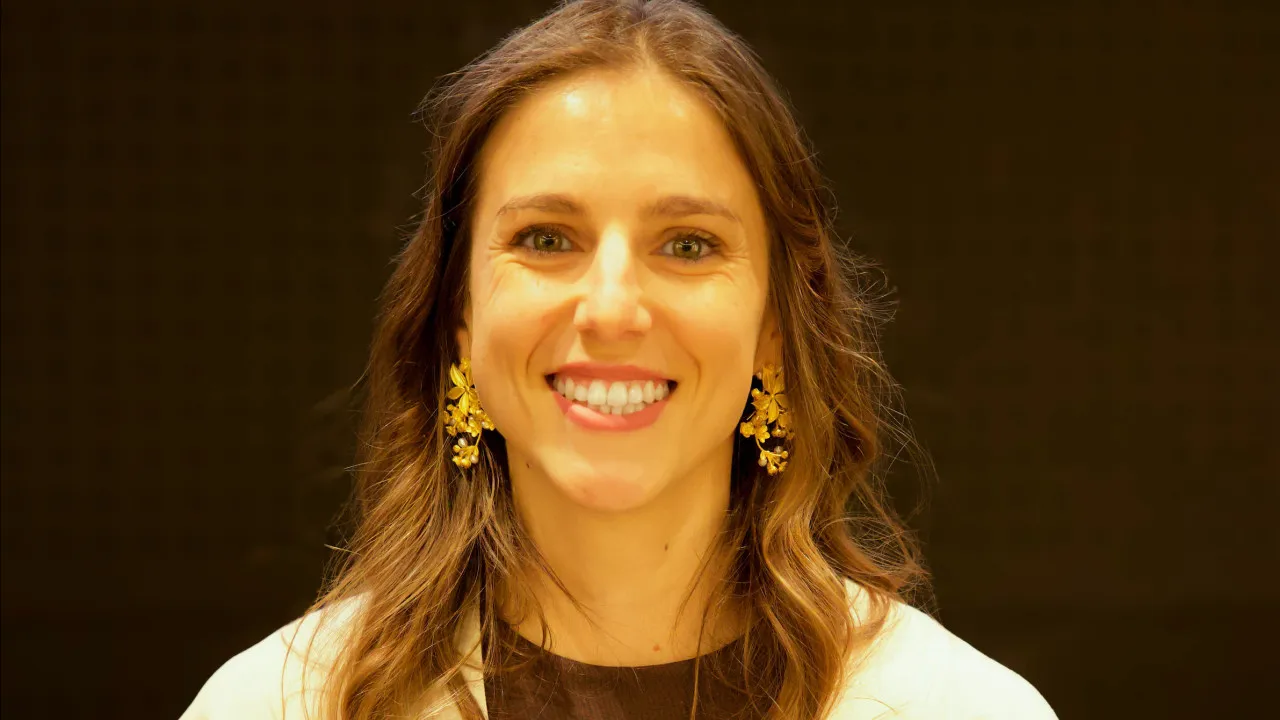
Carina Palma is a nurse specializing in maternal and obstetric health and a mother. The birth of her daughter brought a “profound transformation” to her life, particularly in the postpartum period, during which she felt that despite all her training in the area, she was “failing.”
Knowing that this feeling is very common among new mothers and believing that more attention and support are needed for women during this period, Carina decided to write a book on the importance of self-care and self-compassion.
As highlighted by the healthcare professional in the book ‘Mães Invencíveis, Mulheres Invisíveis,’ published by Oficina do Livro, “we still live in a culture that feeds the belief that when a baby is born, there is a woman who becomes invisible,” and this is what Carina Palma wants to help change.
I felt very alone, doubted all my abilities, and had a lot of difficulty really looking at my daughter without the professional lens
Did you start writing ‘Mães Invencíveis, Mulheres Invisíveis’ during your postpartum period? Despite being a specialist in maternal and obstetric health, do you think, as a mother, you also lacked information to deal with all the challenges this phase brings?
Yes, absolutely. Being a specialist nurse with extensive experience with mothers and babies, I had the expectation that it would be very easy. After all, caring for a baby was something I could do with my eyes closed. I also thought, after a wonderful natural birth and having invested a lot in my personal development, that I wouldn’t “sink.” So yes, I lacked a lot of information, primarily that: babies are not ‘by the book,’ and mothers, who are being reborn along with the baby, need help. I felt very alone, doubted all my abilities, and had a lot of difficulty really looking at my daughter without the professional lens. It was challenging to cling to my maternal instinct amidst so much guilt and feeling like I was failing.
What are the main challenges mothers face postpartum?
There are several, but I would say the main ones are the sense of invisibility, loneliness, guilt and not doing the right thing, couple challenges, comparison with other mothers, and not being able to prioritize oneself. When a baby is born, there is a woman who is silenced, to give space to the mother who is beginning to be created. A perhaps insecure, fragile mother, with hormones at peak, reorganizing. A mother who might have had a difficult birth, who might not have been able to breastfeed, and therefore thinks she failed. Or, on the other hand, a mother who had everything as desired and, still, amidst so much crying and sleep deprivation, thinks she is doing something wrong, doubts herself. And because of all this uncertainty and fear of judgment, it is common for mothers to isolate themselves, to stay in their bubble, not asking for help. Consequently, there is greater emotional fragility.
They teach how to care for and deal with a baby, but they don’t teach how to care for and deal with a mother
There is no lack of literature on how to care for babies, what to do, what not to do, how to encourage sleep, care, feeding, breastfeeding, etc. But there aren’t, at least in Portugal, many books talking about the mother and how she should be cared for and the importance of self-care. Do you think this is a reflection of our society?
Yes, postpartum care is still very focused on baby care. There are many books, videos, and classes on how to change a diaper or bathe the baby, for example (after all, these are topics many parents still request in prenatal appointments), but few about caring for the mother. And I believe, yes, that it is a reflection of society, it is cultural.
When I ask a pregnant woman if she has thought about the postpartum period (more practical things like meal planning, support with the baby, house cleaning, rest, support network), the response is mainly directed at the baby’s layette. When I ask a mother how this experience is going, they easily address topics like “breastfeeding is now going better, still wakes up at night, already gained weight…”. And when I ask, “Okay, and how are you feeling?” there are a few minutes of silence because it’s a rarely asked question. When the baby is born and the couple receives visitors, the attention goes to the baby, who is so cute, and the mother stays there, invisible, believing that moment is just for the baby, activating even more her feeling of unworthiness. Of course, with all these deep-seated habits, the mother believes her needs are not important. It’s general. They teach how to care for and deal with a baby, but they don’t teach how to care for and deal with a mother, who might not even know who she is.
In the book, you give examples of countries that have traditions focused on the treatment and care of women postpartum. What do you think is needed to introduce some changes in Portugal?
Well, it would be nice to dream and make it happen at the moment [laughs]. We live in an era of a lot of information, perhaps in excess, which also brings more confusion and noise. But changes involve continuing to give voice to this topic, without letting it be forgotten or lost:
– Raise society’s awareness (public campaigns, real testimonies, spreading real and human narratives through the media);
– Education and training of health professionals (to focus on this topic in hospitals and health centers);
– Integration of support networks and community services (parenting/maternity support centers; home visits postpartum);
– Political pressure and creation of public policies (proposing maternal health policies that include postpartum care beyond 6 weeks, creating financial and logistical incentives to support the mother’s rest, like extended shared leave, home support or free support groups, working with user associations, professional orders, and members of parliament to present concrete proposals…);
– Empowerment and awareness of women themselves (providing clear, accessible, and empathetic information, as I do in my book; creating listening and sharing spaces among mothers, where there is a sense of security, validation, and guidance, encouraging each woman to prepare not only for childbirth but for her rebirth).
What does a postpartum mother need most? To feel she’s not alone. To have support, not watchful eyes”
What advice would you give to a mother-in-law/grandmother becoming a grandmother for the first time?
Curious and very interesting question. My mother-in-law bought the book, read it, and told me “I wish I had read this book in my day, it would have been easier. I learned a lot of things that I had no idea back then. And I did wrong.” So, I feel this book will truly be an inspiration for grandmothers. My advice or suggestions would be:
– Remember: your daughter/daughter-in-law is becoming a mother, but still needs you – She is being reborn, vulnerable and powerful at the same time. Listen with your heart, offer presence and your help instead of advice that sometimes makes her feel sadder;
– Support, do not replace: She needs to be recognized as the baby’s mother. Offer help so she can rest, feed herself, and connect with the baby, without taking her place (For example: instead of picking up the baby, maybe it’s better to make her tea, cook, or tidy up the house)
– Respect her choices, even if they are different from yours. How to breastfeed, the type of birth chosen, feeding or sleep… everything can be different from your time. And that’s okay. You can share memories, but not as rules or “in my time it wasn’t like this.” Welcome, ask: “How can I support you in your choices?”
– Ask for permission before giving opinions or acting – Even with good intentions, do not make decisions for her, neither with the baby nor with the house. Ask: “Do you want me to tell you what I think?”; “Do you want help with that?”; “Do you need me now or do you prefer some time just the three of you?”.
– Offer emotional security, not judgments – Postpartum is a whirlwind. She can cry, laugh, be tired, insecure, or super confident. All of this is normal. It’s not time to evaluate, correct or compare. What does this mother need most? To feel she’s not alone. To have support, not watchful eyes.
– Take care of the mother, not just the baby. Everyone will look at the newborn. Few will look at the new mother. You can be that beautiful exception: “Did you sleep well?”; “Do you want me to bring you soup?”; “Do you need to take a leisurely bath?”. Without resentment. If you feel you didn’t have that in your time, you now have the opportunity to make peace with that feeling and be kind and gentle…believe me, you will feel very happy.
– Honor your new role, with love and humility. Being a grandmother is a gift. It’s also an invitation to let the daughter/daughter-in-law shine in her motherhood. Be by her side, not in front. Be close, but with space.
Postpartum is not measured in weeks, it’s measured in layers
And to husbands? In the book, you mention a husband who didn’t understand how his wife was still in postpartum when the baby was four months old…
Yes. That’s one of the big mirrors of our society: a deep ignorance (and often devaluation) of what postpartum truly is, especially for the woman. When a man says “but it’s already been four months,” what is implied is that what is visible (the baby) has already changed, so what is invisible (the woman’s internal state) should have passed too. But as I state in the book, postpartum does not have an expiration date. Being a partner in this phase requires more than love — it requires awareness. So here are my suggestions for husbands:
– Postpartum doesn’t have a deadline, it has a process. Your wife has not returned to who she was. And she shouldn’t. She is becoming. She is healing, integrating, getting to know the baby, and herself all at once. She needs you to know: postpartum is not measured in weeks, it’s measured in layers.
– Be the safe harbor, not the emotional officer. She doesn’t need someone saying “you have to be more positive,” “you’re always tired,” “you should be happy.” She needs a look that says: “I’m here with you, even when I don’t understand everything.”
– Learn, ask, participate. Read, inform yourself, ask how she is (truthfully), take on tasks without expecting her to say. Remember you’re not the help; you are a father, a partner, an active part of the family.
– Your support may be more important than that of her mother. Did you know that how the partner supports the woman postpartum has a direct impact on her emotional and physical recovery? Your love now wears actions: giving her time to rest, protecting her space, validating her decisions…
– Speak less, listen more: Not all her pain needs a solution. Some just need presence. The phrase “I’m here with you, even when I don’t know what to say” is worth more than a thousand pieces of advice.
– Remember: loving a baby is also loving the woman who bore him. Take care of her. Give her support. Tell her she is doing her best. That you see her. Because often, she feels invisible. And your look might be what keeps her standing.
Postpartum isn’t just the smell of a baby. It’s also crying, loneliness, anger, frustration, and a lot of vulnerability
And how can future mothers prepare for the postpartum whirlwind?
An excellent question, often ignored. My book discusses various strategies. Postpartum is real, intense, transformative… but often romanticized or silenced. Preparing doesn’t mean avoiding the whirlwind, but knowing how to swim in it without drowning. Preparing for postpartum is as important as preparing for birth. There are some deep, practical, and conscious ways for a pregnant woman to prepare for postpartum, based on the balance between science, inner wisdom, and emotional reality, which I always advocate:
– Understand that postpartum begins before birth. The body will give birth to a baby, but the ‘soul’ will give birth to a new woman. It’s important to be informed about what changes in your body and mind after birth (hormones, sleep, emotions, breastfeeding, identity), choosing safe and real sources;
– Have a ‘postpartum plan’ as serious as the ‘birth plan’ – Who will cook? Who cleans the house? Who will listen without judging? It’s essential to make a practical, emotional, and logistical plan at least for the first 40 days: Who will be available to support (without invading)? What foods/meals will I have prepared to nourish me? How will I protect my rest and space? What warning signs will I recognize if persistent sadness or extreme exhaustion is felt?
– Prepare emotionally the partner and family – The surrounding people need to know that the priority is the woman. Explain, before birth, what you expect from them. Share texts, videos, podcast episodes. Use your voice to set your boundaries with love.
– Cultivate a safe and judgment-free support network (trustworthy professionals, other real mothers, friends, family,…)
– Work on expectations: Postpartum isn’t just the smell of a baby. It’s also crying, loneliness, anger, frustration, and a lot of vulnerability. Write, meditate, talk about how you imagine postpartum and then open space for the unexpected. Your strength will be in emotional flexibility, not control.
– Reminder for every day: The mother is as important as the baby! The baby’s care and comfort are proportional to the mother’s. Here I suggest writing a letter to the future mother, with comforting words or an audio to listen to on those days when you feel sadder and more insecure. I recorded an audio during my pregnancy and listened to it several times throughout postpartum, and it was very useful.
In essence, we cannot control a life that is unpredictable, yet we live by plans, dreams, goals. Ensuring as light a postpartum as possible is mandatory. If I could summarize, it would be: how can I ensure I will be nurtured physically and emotionally? Who will help me, so I can rest?
You currently accompany women and couples during pregnancy and postpartum in consultations and share educational content. What are the main doubts that reach you? Do you think couples are prepared for what’s to come?
On a more rational level, maybe yes, as there is a lot of information circulating, but on a more intuitive and conscious level, it might still be a path, given that this Era of technologies and information overload distances us from our essence. With the reality of maternity hospitals in Portugal, women feel afraid and want to ensure they don’t go through traumatic processes, the same happens post-birth, there is a need to control to ensure everything is perfect and no traumas are caused to our children. The main doubts are essentially about childbirth, how to deal with pain, what to do to avoid obstetric violence, how to bathe a baby, how to change the diaper, how to deal with crying, breastfeeding issues… basically, if we delve into all the doubts, the ultimate goal is to ensure the baby is okay.
What do you advise women to do in response to the comments society tends to make when a baby is born?
Another very necessary question. Because when a baby is born… a “torrent” of comments is also born. Many come with good intentions, but few with awareness. And women, often still fragile and vulnerable postpartum, absorb these words as truths… when in fact, many are projections or cultural myths. My suggestions for women bombarded by often unnecessary comments are:
– Breathe before reacting, choose to respond instead of absorbing. When someone says “should already be sleeping all night,” or “haven’t you returned to your body yet?”, or “you have to be careful not to spoil too much.” Breathe. That says more about who speaks than about you. Tell yourself: “This comment is theirs. I don’t need to take it with me.”
– Create your emotional protection shield – You can even imagine an invisible shield protecting you from external noise. Before family gatherings or visits, affirm internally: “I trust myself. I’m doing my best. I don’t need anyone’s approval.”
– Use short, firm, and kind responses (if you want to respond). Some phrases that convey respect without justifying: “We are doing what we feel is best for us.”; “Thank you, but we prefer to do things differently”; “We are following what we learned with our trusted professional”; “This is a very sensitive time, what I need most now is support, not advice” or even “I don’t want to talk about it now”; “I prefer not to go into that subject”.
– Remember: your baby doesn’t need a perfect mother, it needs you, present, real, and true. Every time you doubt yourself because of a comment, ask: “Is this idea coming from my intuition… or the fear of not pleasing?”
– Surround yourself with voices that nurture you, and silence (or distance) those that drain you. In this phase, you need real support. Those who don’t respect your boundaries are not taking care of you. Choose to be with those who listen without correcting, with those who welcome without judging.
– Take care of your internal voice, so it doesn’t become an echo of society. External comments only enter if your internal world allows them. Practice daily affirmations: “I trust my instinct”; “I am enough”; “Motherhood is mine, not society’s”.
The way our ancestors experienced motherhood influences us
How can the way our grandmothers, mothers, and other women in the family experienced motherhood affect how we see and experience it?
This is a deep question, touching on the invisible roots of our motherhood. Because before becoming mothers, we were daughters of other women who also mother. And the way they experienced motherhood, often with pain, silence, sacrifice or even denial of themselves, often shapes, without us realizing, how we experience it. So, the way our ancestors experienced motherhood influences us. Even without words, we inherit glances, fears, beliefs, ways of loving, and nullifying ourselves. Another issue is epigenetics, science already shows that emotional traumas experienced by grandmothers can affect the mental and emotional health of granddaughters, meaning if your grandmother suffered a violent birth, an unresolved grief, a lonely motherhood… that unexpressed suffering might be vibrating in you, not as destiny, but as an invitation to healing. What also affects us is the way we were raised, many of us came from a controlling upbringing and are moving towards permissive upbringing, and finding the balance is a daily task. Many women feel divided: either they try to do everything like their mothers did (in the name of loyalty) or do the opposite (in the name of liberation). But both options arise from a reaction. The true path is to ask: “What is truly mine here?”. The pain that wasn’t spoken turns into silence within us. If your mother never talked about postpartum, if your grandmother never said she cried, and if no one validated the pains of motherhood… it’s likely that you feel guilty for everything you’re feeling. That you think you are failing, because “nobody told me it was like this”. This silence across generations creates a void that can make us feel alone, even when surrounded by people.
What are the main tips you would like to highlight that can make a difference in the lives of women who are about to become mothers or are new mothers?
When a woman is about to become a mother, or has just become one, what she needs most is not magic formulas, but truth, support, and presence. And small great tips can be transformative:
– The first is the one I’ve already mentioned: think about postpartum with the same importance as birth. Having a realistic, practical postpartum plan adapted to the physical and emotional needs can make a difference;
– Have a freezer stocked with food, ask your mother, mother-in-law, or a friend to cook or buy ready-made but nutritious meals, to ensure that at least for a month (minimum in my opinion), you don’t think about cooking. You may feel well, but believe, you need to do the minimums because caring for a baby is already doing the maximums;
– Protect your physical and emotional space: Not everyone needs to see the baby in the first days. Visits should care, not give work. Learn to say “now is not the best time, thank you for understanding”;
– Asking for help and accepting help is the greatest act of courage and self-love: it’s not a sign of weakness. It’s ancestral wisdom. Asking for help doesn’t mean being incapable, it means knowing you weren’t born to do everything alone. Accept the offered dinner. Ask someone to hold the baby while you shower. Delegate without guilt;
– Get informed about breastfeeding (before you need it), if that’s your wish: breastfeeding is natural, but not always intuitive. Knowing what to expect (milk descent, correct latch, warning signs) makes all the difference. And, if it doesn’t go as you imagined, remember: your value as a mother is not measured in milliliters;
– Speak to yourself with love: if you tell yourself “I’m not managing”, remember: You are managing; it’s just difficult. And it’s normal, part of the adaptation process;
– Validate all your feelings, without judgment: it’s possible to love your baby and want to run away. Feel grateful and exhausted. Motherhood is paradoxical. You’re not failing, you’re feeling. And that’s being human;
– Know the warning signs of postpartum depression or exhaustion and talk to a perinatal psychologist and/or psychiatrist (these topics are all covered in my book);
– Remember: your experience is valid, even if different from other women’s experiences: don’t compare. Don’t try to fit into what you see on social media. You are the right mother for your baby, with your story, your body, your time. You are not alone. And you don’t need to be perfect to be wonderful.




